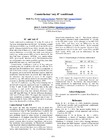Counterfactual ‘only if ’ conditionals
Citation
Suzanne Egan. “Counterfactual ‘only if’ conditionals”, 25th Annual Cognitive Science Conference, Boston, MA. Aug 2003. (Refereed).

View/
Date
2003Author
Egan, Suzanne M.
Byrne, Ruth M.J.
García-Madruga, Juan A.
Peer Reviewed
YesMetadata
Show full item record
Suzanne Egan. “Counterfactual ‘only if’ conditionals”, 25th Annual Cognitive Science Conference, Boston, MA. Aug 2003. (Refereed).
Abstract
People understand a conditional, 'if A then B', such as 'if Peg went swimming then she felt well' by keeping in mind
only true possibilities, e.g., A and B, not-A and not-B, not-A and B (Johnson-Laird & Byrne, 2002). Initially they think
about only a few of them, e.g., A and B, because of working memory limitations. As a result, they make some inferences
readily e.g., modus ponens (MP), given A, therefore B. But they find other inferences difficult, e.g., modus tollens
(MT), given not-B, therefore not-A. The information does not correspond to their initial possibility and they must think
about other true ones, e.g., not-A and not-B.
Keywords
CounterfactualConditionals
Only
If

